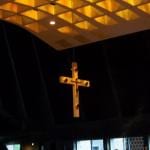The website of the Dove World Outreach Center describes the tiny church in Gainesville, Fla., as “a New Testament church based on the Bible, the Word of God.”
Someone might want to tell them that they missed that whole “Blessed are the peacemakers” part.
While there is great debate about what, exactly, Jesus meant by many things he is quoted as saying in the New Testament, the “peacemakers” passage is not one of them. It is eminently clear that Jesus was talking not just about being peaceful, but also creating peace in the world.
As we’re all too painfully aware by now, the church, led by Pastor Terry Jones, put the Quran on trial on March 20 and set it aflame as punishment. That act, in turn, sparked deadly riots in Afghanistan that killed nearly two dozen people, including several United Nations peacekeepers.
To lob a religious grenade into the fragile tinderbox that is the Islamic world is the opposite of what Jesus described.
“We do not feel responsible — no,” Jones said in an interview with ABC News. “We feel more that the Muslims and radical Islam uses that as an excuse. If they didn’t use us as an excuse, they would use a different excuse.”
Whether the kind of violent response witnessed in Afghanistan over the past week was Jones’ intention or not, it is precisely what his actions have wrought.
That is not peaceable. It is wrong. It is sinful. It flies in the face of the message that the Prince of Peace brought to the world, and makes a mockery of the white dove referenced in the very name of Jones’ horribly misled church.
When Jesus said that “peacemakers” would be blessed and called the “children of God,” he wasn’t just talking about people who are peaceful or hope for peace. Jesus was talking specifically about those who “make” peace, those who work for harmony in conflict and unity in divisions.
Jones told ABC that he presided at the “International Judge the Quran Day” event and the subsequent burning to raise “awareness of this dangerous religion and this dangerous element” within Islam.
The irony that his asinine actions portrayed his own Christian faith and values as pretty dangerous themselves seems to be lost on Jones. But it’s not lost on many other Christians, Muslims and people of good faith around the globe: the British government deemed Jones such a danger that in January it barred him from entering the U.K. to protect “the public good.”
Theologically speaking, Jones shouted “Fire!” in a crowded theater. He caused a riot. Lives were lost. And their blood is on his hands.
The deadly potential of Jones’ Quran burning was something he was well aware of before he lit the match. Jones first threatened to burn the Muslim holy book last fall on the anniversary of the 9/11 terrorist attacks. President Obama, Secretary of Defense Robert Gates and a host of international political and religious leaders publicly urged Jones to abandon his plans. And for a time, he did.
But six months later, ignoring political, religious and military warnings about the clear and present danger of his plans, Jones brazenly carried them out anyway.
Although Jones shares culpability for the deaths in Afghanistan with his fellow religious extremists (in this case Muslim rather than Christian fundamentalists) whose insane rage physically took so many lives, Jones was the catalyst, the chief provoker and inciter.
While Jones claims it was within his civil and constitutional rights to burn the Quran, some legal experts, including U.S. Supreme Court Justice Stephen Breyer, are seriously questioning whether the First Amendment should protect speech that directly incites violence at home
or abroad.
In a 1919 Supreme Court decision, Justice Oliver Wendell Holmes famously said that even the “most stringent protection of free speech would not protect a man in falsely shouting fire in a theater and causing a panic.” The question to be answered, Holmes said, “is whether the words used are used in such circumstances and are of such a nature as to create a clear and present danger that they will bring about the substantive evils that Congress has a right to prevent.”
Breyer is trying to figure out what that means in the 21st century.
“Holmes said it doesn’t mean you can shout `fire’ in a crowded theater,” Breyer in a televised interview last fall. “Well, what is it? Why? Because people will be trampled to death. And what is the crowded theater today? What is the being trampled to death?”
Whether Jones’ words and actions are or should be protected by the Constitution is a matter for the courts to decide. But in the court of public opinion and in the realm of religious ethics, Jones stands in violation of all that is right and just.
Jones should remove the dove from his church name and replace it with a more accurate symbol of what it stands for.
A holy hand grenade, perhaps?
This commentary originally appeared via Religion News Service.
[wpvideo aXZJQ7wl]















